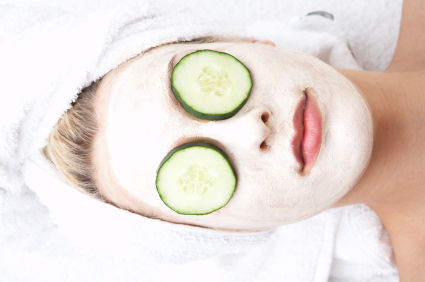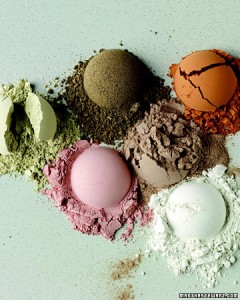The DIY Facial

Sometimes the best cures are the least expected. In your skin’s case, one of the best methods for cleaning pores is, well, more dirt. Gathered from volcanic ash, quarries, and sea floors around the world, cosmetic clay contains a host of skin-nourishing minerals, and its naturally absorbent properties help draw debris, dead skin cells, excess oils, and other toxins from pores. Used weekly, a clay mask (also called a mud mask) results in a smooth, supple, deeply clean complexion.
Mixing clay powder with cool, filtered water is the simplest way to prepare a mask, but you can get added benefits by using other liquids. Cool green tea provides an extra antioxidant boost that may help fight the formation of fine lines.
To soothe irritated or very dry skin, you:
1. To start, add one tablespoon of water, green tea, or milk to a small bowl. Gradually add two tablespoons of fine clay powder to the liquid, stirring to prevent clumps. The result should be a smooth paste; if it’s too thick or too runny, add a few drops of water or a little more clay to achieve the desired consistency.u can try mixing the clay with cold milk or cream.
2. Using your fingers, apply a thick layer of the paste to clean, dry skin, avoiding the eyes and lips. (For a more even application, use a clean one-inch paintbrush.) Sit back and relax while the mask dries, staying as still as possible so the clay doesn’t crack and fall off.
3. After 10 to 12 minutes, rinse with warm water.
4. Pat dry with a fluffy towel and follow with a natural toner and a light moisturizer to soften and nourish skin throughout the day.
Choose the Right Clay
Some clays are gentle skin purifiers that do not absorb oil, making them good for dry or sensitive complexion
Dry Or Sensitive Skin- White, pink, or yellow kaolin clayns. Others are deep cleansers that pull oil and toxins from the skin, which can help normalize oily skin and fight the effects of pollution. For best results, choose one that suits your skin type.
Oily Skin- Bentonite, red or blue montmorillonite, French green, red kaolin, or Moroccan rhassoul clay.
All Skin Types- Dead Sea clay

Courtesy of Body+Soul, October 2005

